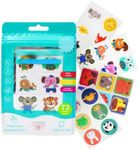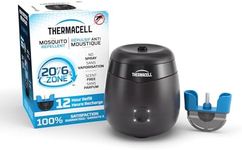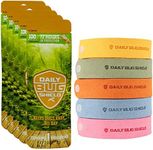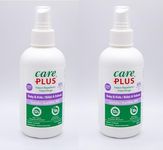Buying Guide for the Best Mosquito Repellent For Kids
Choosing the right mosquito repellent for kids is important to ensure their safety and comfort while effectively protecting them from mosquito bites. Kids have more sensitive skin and different needs compared to adults, so it's essential to look for products that are both gentle and effective. When shopping, focus on the ingredients, application method, duration of protection, and suitability for your child's age. Always read labels carefully and consider your child's specific sensitivities or allergies.Active IngredientThe active ingredient is the main component that repels mosquitoes. Common options include DEET, picaridin, IR3535, and natural oils like citronella or lemon eucalyptus. This is important because some ingredients are more effective or safer for children than others. For example, DEET is effective but should be used in lower concentrations for kids, while natural oils are gentler but may not last as long. When choosing, consider your child's age and any skin sensitivities. For infants and toddlers, opt for products specifically labeled as safe for young children, and always follow the recommended age guidelines.
ConcentrationConcentration refers to the percentage of the active ingredient in the product. Higher concentrations usually provide longer protection but may increase the risk of skin irritation, especially for kids. For children, lower concentrations (such as 10-30% DEET or similar levels of other ingredients) are generally recommended. If your child will be outdoors for a short time, a lower concentration is sufficient. For longer outdoor activities, you might choose a slightly higher concentration, but always stay within the safe range for kids.
Application MethodMosquito repellents come in various forms, such as sprays, lotions, wipes, and wearable devices like bands or stickers. The application method is important because it affects how easy and safe it is to use on children. Sprays and lotions provide even coverage but require careful application to avoid eyes and mouth. Wipes are convenient for targeted use, while wearables are non-contact but may be less effective. Choose a method that matches your child's age, activity level, and your comfort with applying the product.
Duration of ProtectionDuration of protection tells you how long the repellent will keep mosquitoes away after application. This is important for planning outdoor activities and minimizing the need for frequent reapplication. Products with longer-lasting protection are useful for extended outings, while shorter durations may be fine for quick trips outside. Always check the label for how long the product lasts and reapply as directed, but avoid overuse, especially on young children.
Suitability for AgeNot all repellents are safe for all ages. Some ingredients or concentrations are not recommended for infants or very young children. This is crucial because young skin is more sensitive and can react differently to chemicals. Always check the product label for age recommendations and choose a repellent that is specifically formulated for your child's age group. If in doubt, consult your pediatrician before use.
Skin Sensitivity and AllergiesChildren can have sensitive skin or allergies to certain ingredients. This is important because using the wrong product can cause irritation or allergic reactions. Look for repellents that are hypoallergenic, fragrance-free, or tested for sensitive skin if your child has a history of skin issues. If trying a new product, do a patch test on a small area first to check for any reaction before full application.
















